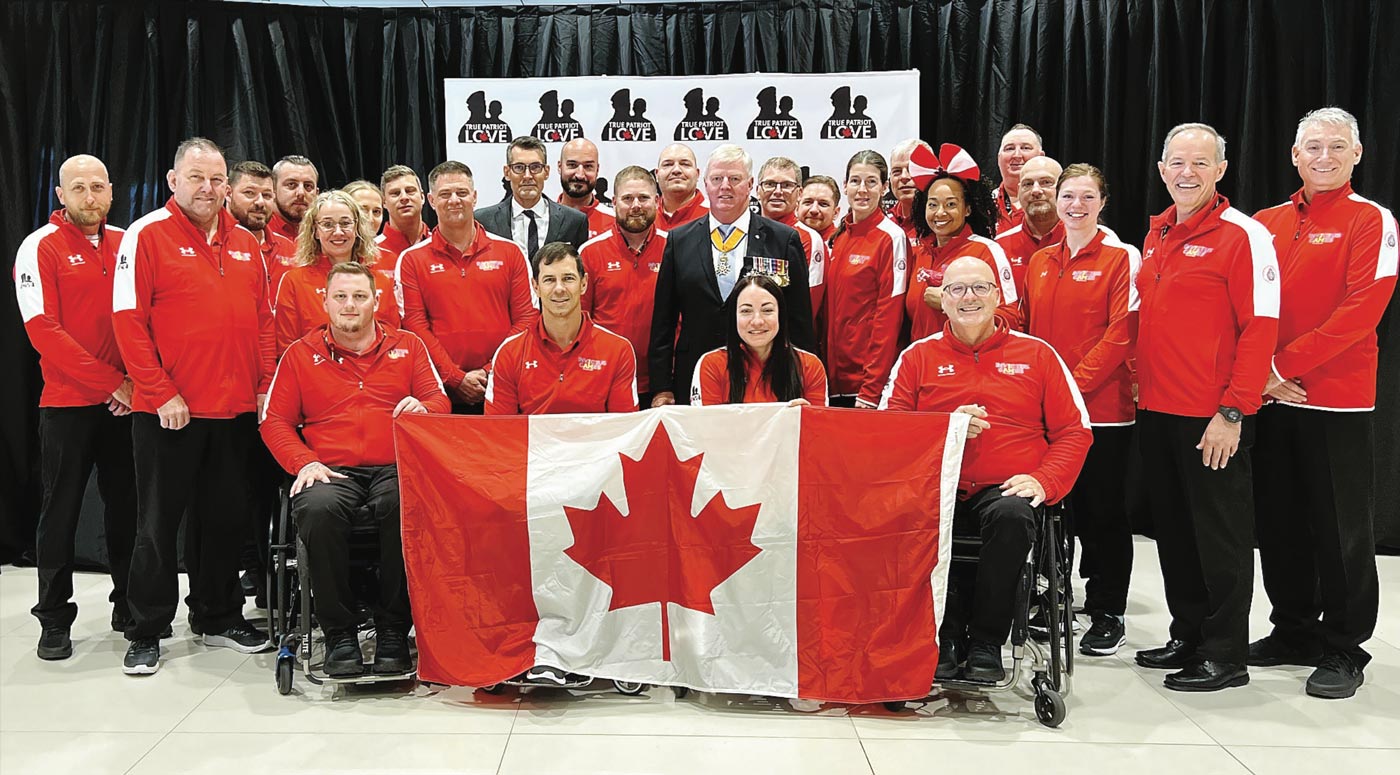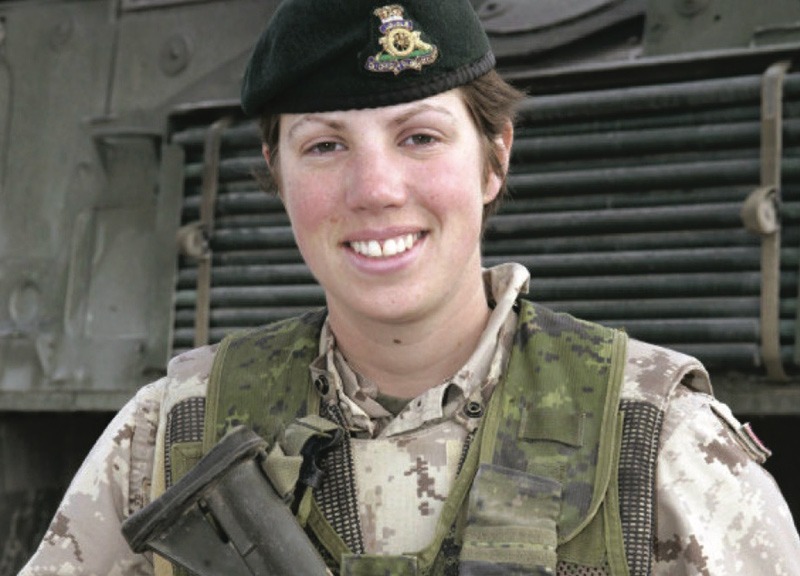Wounded Warriors, Unconquerable Still

“We were never trained for something like this.”
Elizabeth Moody
On September 2, 1998, at 10:31 a.m., Swissair flight 111 – on a regularly scheduled run from New York to Geneva – crashed five miles off Peggy’s Cove, Nova Scotia, killing all 229 passengers and crew onboard. The aircraft broke apart on impact. There were no survivors.
Local boaters rushed to the scene. Not long after, the Canadian Navy and Coast Guard were at the crash site. Divers were dispatched to retrieve fuselage and body parts. The gruesome task of labelling and freezing began.
One of the divers was Chief Petty Officer Second Class Christian Primeau, who served on HMCS Ville de Québec. Primeau had joined the navy when he was 19 and spent more than 200 days a year at sea. He saw the world. He loved the job. And he was trained as a diver, in fact a fully qualified PADI (Professional Association of Diving Instructors). A 20-year veteran of the service, his vessel was out on a training mission when it was directed to the emergency off Peggy’s Cove. As he recalled in a recent interview: “We were never trained for something like this.”
This was an unimaginable horror. His job was to surface dive, bringing up body parts and separating them from pieces of the wreck. Months later he started having problems. While many of his brothers and sisters at the scene left the service, giving up their uniforms, he hung in. But the trauma led to symptoms of acute operational stress. He said he was lucky. Operational stress trauma centers were just starting to be opened by the Canadian Forces (CF). He was one of the first who sought treatment in Halifax.
But still, the alpha-male vocabulary reigned in the services. Today, things are better, he says. People are now more likely to talk about their invisible injuries. It’s now part of the conversation.
But at the time of the Swiss Air Crash, that conversation was yet to be had. Shortly after, in 2000, the Croatia Board of Inquiry published its report into the horrors faced by Operation Harmony, the Canadian peacekeepers who had served in Croatia during the rampage of Slobodan Milosevic across the former Yugoslavia. The report detailed the ethnic cleansing Canadian peacekeepers saw. The murder. The torture. Many came home sick.
The inquiry called hundreds of witnesses. As the testimony went on, a nation listened. The nightmares in the Balkans had caused their invisible wounds.
The horrors of the Rwandan mission had become public only a few years earlier. Canadian peacekeepers witnessed the slaughter of more than 800,000 Tutsis in the course of 100 days in 1994. No one should have had to see any of this, recalled retired Lt.-Gen.Romeo Dallaire, commander of the Canadian mission. He often spoke courageously and openly about his own subsequent thoughts of suicide.
Gradually, at the dawn of a new century, a whole new level of understanding was born on the long-term impacts of battlefield trauma. The CF acknowledged that Operational Stress Injuries (OSIs) were often invisible. Once afflicted, veterans drifted into lost lives. With out-of-control rage. Or suicide ideation. Or substance abuse. Or terrifying nightmares. Often detached or disassociated. Lost families.
More than 40,000 CF personnel in Afghanistan between 2001 and 2014 fought some of the most ferocious battles of our time against a resolute, well-armed Taliban.
One hundred fifty-eight Canadians were lost to their explosive devices; suicide attacks led to incomparable injuries and permanent physical disabilities. And 13 percent of CF personnel have since been diagnosed with mental disorders attributable to their Afghanistan deployments.
The Invictus Games are all about the power of the human spirit. Our wounded warriors were unconquerable once. The games are about restoring that power. Unconquerable again.
And the power of sport, as the Games founder, Prince Harry, Duke of Sussex, has said, can bring those veterans who have lost so much, back from the brink, back to life, back to honour and self-esteem.
The True Patriot Love Foundation has won the bid to host the Invictus Games 2025 in Vancouver and Whistler.
Dr. Namita Joshi, chief program officer at the foundation, says the transitioning of veterans between military and civilian cultures is all-important: “We believe strongly in the value of mentorship in order to support our veterans as they cross that bridge.”

The 4th Annual Captain Nichola Goddard Leadership Roundtable, sponsored by Enbridge, is a case in point. Nichola was 26 when she was ambushed and killed in Afghanistan, the first Canadian woman to die in combat. The roundtable features sessions facilitated by women from the Canadian Armed Forces. Valued mentors at a time of public revulsion at military-related sexual assault in the services, they bring attention to the challenges servicewomen face.
And the power to rise above them. While women account for only 15 percent of CAF members, they represent 30 percent of the nearly 5,000 veterans who are homeless or who use shelters.
David Howard co-founded the Homes for Heroes Foundation after a visit to his grandfather, a service veteran he had never met. He found him living in squalor. The daily sight of Afghanistan veterans on the streets of Calgary, many sleeping in the rough or in their cars, convinced Dave and his partner, Murray McCann, a local philanthropist, to act. The idea was to build villages of 20 tiny homes facing one another, giving veterans a feeling of community; a chance to care for one another – in every major city across the country.
“What the veterans have told us is that they want to come into a place, make sure they understand that they have a home, and work on themselves,” Howard says. “They have said to us that they then would want to move out of the project, make room for the next person and be the mentor for that person. Thirteen veterans have already graduated from the Calgary homes.”
Homes for Heroes has received roughly $900,000 in funding through the Veterans Family Well-being Fund (VAC). Canadian Pacific has hosted the Spin for a Veteran stationary bike marathon over the past number of years and raised more than $1.9 million. The Brick donates all the appliances and bed sofas for an estimated value of $300,000 per complex. The Winnipeg Kinsmen Veterans’ Village was announced in May, with Kinsmen pledging $1 million, and the City of Winnipeg $500,000, matched by the province. On to Kingston, Dave says. Then Montreal.
Paul Whitehead is the clinical director of the Veterans Transition Network, which has been helping military personnel transition to civilian life and to deal with their trauma in a confidential and non-threatening way for more than 20 years. Partnering with military charities such as True Patriot Love and VAC, they have developed individual and group therapy for veterans, first responders and RCMP officers. Whitehead spoke about the lack of trust that often exists among at-risk veterans. Adapting from the military culture of brothers and sisters to civilian life is hard, he said, because in joining the military in the first place, people find a sense of belonging and when they are released, feel isolated. Many lose the sense of the group or the military family and along with that the honour of their service as well. “But for many victims of severe OSI or PTSD symptoms,” he said, “sharing their story in a group is worse than going to battle.”
He continued: “It’s hard work to renew trust, employability, and family lives. And the challenges of filling out a form to prove you have lost a leg are, for many, much worse than sleeping in the rough. What does that government official know about what we went through at Operation Medusa?
VAC plays a national role in terms of its presence and overall reach. But a big part of its role is to raise awareness among the many community organizations that work with veterans. “We partner with community agencies that best understand the local population,” said Natalie Pham, VAC Program manager in Quebec. Partnering is crucial, but so are solutions to the disability- claims backlog highlighted in the recent Auditor General’s report. But according to VAC, a lot of progress has been made over the last eight months. The government has promised to eliminate the backlog completely by 2024.
Branches of the Royal Canadian Legion across the country will be keeping a close eye on the government’s performance. This is an advocacy group with clout and century-long traditions. They aren’t known to take “no” for an answer.
Robin Pelletier, service officer of the Legion branch in Hudson, Quebec, supports veterans with PTSD issues. “My job is to help them find the support they need,” he says. “Knowing the services the military and VA can offer is key.”
The Legion also provides service dogs trained to calm veterans in or on the verge of a PTSD episode. “We help cover the costs as best we can,” Pelletier says. “Seeing a dog in action made me speechless,” he said.
The president of the Legion’s Hudson branch, Rod L. Hodgson, showed a visitor around the legion hall. The 158 poppies honoring Canadian soldiers who were killed in Afghanistan and a riveting wall hanging of the D-Day landing at Juno Beach served as a backdrop to then upcoming luncheon ceremonies honoring the 78th anniversary. I asked about the impressive picture of the aircraft on the back wall.
That aircraft is the Argus, he told me. He then pointed to a gentleman coming in the front door. “And that’s Jack Bannon, he said. He flew that plane during the Cold War.”
A veteran raising money for veterans, selling poppies, and keeping Canada’s military inheritance alive. Because that’s what the legion does. They are irreplaceable. Why? Lest we forget.
Contributing Writer Elizabeth Moody is an international business consultant and communications specialist. She served as archivist for the late John N. Turner, former prime minister of Canada.
